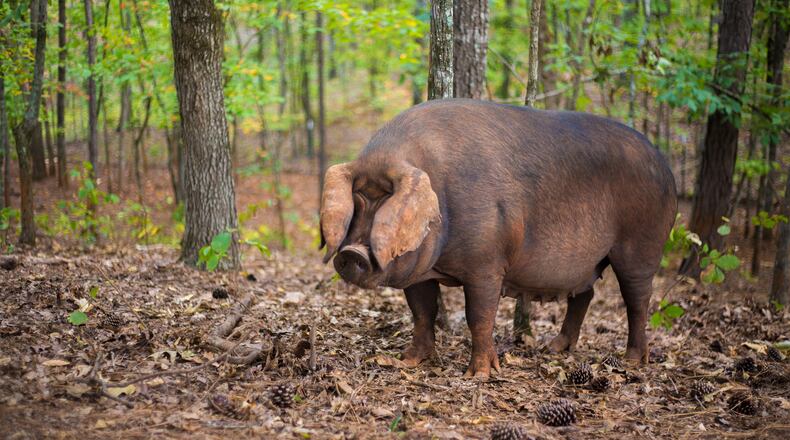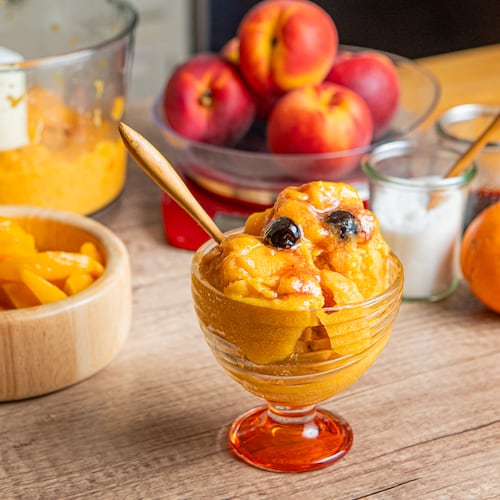The U.S. Department of Agriculture predicts the American consumer will eat on average more than 220 pounds of red meat and poultry this year.
If that’s a number that resonates with you, are you considering “sustainability” when you’re buying the protein to serve for dinner?
Are you thinking about the environment, greenhouse gas emissions, water use or land use?
Does “sustainable” to you mean the animals you’re eating were humanely raised and slaughtered? What about the use of antibiotics and steroids in growing those animals?
Does your definition of sustainable consider the cost of transporting the meat? And what about the economic impact on your local community? And the welfare of the workers who are raising those animals?
When Judith Winfrey, president of the meal kit company PeachDish, thinks about sustainable meats, she's considering environmental impact, animal welfare, and local economic impact. "As with everything we source, we're seeking out meats that are responsibly produced, local to Georgia, humanely raised, and (generated) where we can have a direct relationship to the farmer," she said.
That direct relationship is key for PeachDish, an Atlanta-based company that sells thousands of meals every week. “We know when we buy directly from the rancher or farmer, the food has … been produced by someone who cares about the end result,” Winfrey said. “It’s important to us to spend our money with businesses that have an impact in the community right around us. We know a dollar spent with a local business stays in the economy 75 percent longer, and we think that’s important.”
PeachDish buys almost all its pork from Josh Davis of Frolona Farm in west central Georgia. Davis said "sustainable" has become a buzzword used in many different ways.
“For me, in the specific context of being in a business raising livestock, sustainable means three things: raising happy, healthy animals in a way that’s beneficial to the land and is still profitable.”
Davis raises grass-fed, grass-finished beef and pastured pork on the family’s 620-acre farm, one that has been in the family since 1828.
“One of the most important things I do is allow the animals to express their basic ‘animalness.’ Our pigs are raised on dirt in the woods so they forage on roots and nuts. The cows are all born on the farm and raised entirely on the farm. They’re on pasture until the day they’re taken to slaughter,” Davis said. “We hold the animal’s health as our No. 1 priority, and we try to respect them and treat them as humanely as possible.”
In just the past few months, Frolona Farm became “Animal Welfare Approved,” a certification from A Greener World. The organization audits farms annually to ensure its stringent animal welfare standards are met.
Rotational grazing is a key practice on Frolona Farm. Cows move from pasture to pasture, and pigs rotate through several 4- to 5-acre pens. “It increases the soil health and the plant diversity to have these animals move around, breaking up ground, leaving their manure to build up the soil,” Davis said.
Michael Wall, Georgia Organics' director of farmer services, said it's up to each consumer to decide his or her priorities and then buy based on those values.
“With the ‘USDA organic’ label, I don’t need to define what that means. Congress has done it and there’s a pretty rigorous system in place to enforce and regulate what that label means. But it doesn’t cover animal welfare,” Wall said.
“If you’re concerned about social justice, look for the ‘Food Justice Certification’ label. That’s something we have to talk more about,” Wall said. “Our state doesn’t come from a positive place in the history of agriculture and race. But we’re not going to have a sustainable food system if one part of our community is ostracized from healthy living and healthy food.”
Another of Wall’s priorities is climate change and carbon. “If we don’t fix that, ain’t nothing going to be sustained much longer,” he said.
“We have to have carbon sequestration, removing carbon dioxide from the atmosphere and holding it in the soil. Cows, or other types of livestock, farmed with rotational grazing, are the best way to do that.”
When Wall thinks about the flavor of the meat he's eating, he immediately points to Jon Jackson of Comfort Farms in Milledgeville. "He understands how the breed of the hog matters, and how the grass and water affect the flavor of the meat."
Jackson keeps about 70 pigs and raises litters of his special breeds to share, building up a community of small farmers in Middle Georgia who also grow cattle, sheep, goats, rabbits and seasonal vegetables.
The farm, named for Jackson’s buddy Army Ranger Captain Kyle A. Comfort, gives 100 percent of its profits to caring for veterans and training them to become farmers.
“We have these debates all the time, whether farmers should be emotionally attached to what they’re growing. If I ask the consumer, ‘Would you rather buy from someone who cares?’ the answer is, ‘Yes.’ They know that person will go the extra step to make sure things are done right,” Jackson said. “At the end of the day, I want to be sure my animals are living the best life possible, because at the end of the day when I serve that animal on a plate, I want to make sure they are represented well.”
That caring also sways Jackson’s decisions about whom will get to purchase his animals. “Can the chef pay the reverence due this animal at the end of its life? We want to be sure our animals go to people who understand the value of what’s coming off the farm.”
As Winfrey of PeachDish suggested, one way to be sure you’re buying meat that meets your definition of sustainable is to have a direct relationship with the farmer.
Jackson suggests asking about the breed of animal the farmer is raising and what it has been eating. How was it raised and what kind of medical care did it get? And ask the farmers how they cook the meat for themselves.
Of course, it’s only possible to ask these questions in a venue where farmers meet consumers, such as your local farmers market. Or if you buy your meat online, you can check out the farm’s practices and certification there.
And if you’re purchasing meat from a grocer or butcher, look for certifications that tell you the animal was raised in a way that meets your definition of sustainability.
CERTIFICATIONS TO LOOK FOR:
Many large farms will have one or more of these certifications. Your local farmer may not, although they may be adhering to the standards. If the meat at your grocer is certified by one of these organizations, it will display one or more labels on its package or in the butcher’s case.
Animal Welfare Approved is a third-party certification and food label for meat, eggs and dairy products that meet A Greener World's standards for animal welfare and environmental stewardship. The organization audits farms annually to be sure animals live in a way that allows them to follow their natural instincts, and requires high-welfare slaughter practices and pasture access for all animals.
The Certified Humane label is available for farmers who support the humane treatment of farm animals by following the standards of Humane Farm Animal Care, a global nonprofit. Standards include the prohibition of food additives such as antibiotics and hormones and the prohibition of cages, crates and tie stalls. Certification is verified by annual thorough farm audits.
Food Justice Certified is a program of the Agricultural Justice Project, certifying that farms, brandholders, retail grocers and restaurants meet standards for fair treatment of farm workers, that the farm received fair pricing and terms for its products and that trade practices throughout the supply chain are fair and transparent.
Global Animal Partnership offers a 5-Step® Welfare Rating Program. Steps range from 1 where there are no cages, crates or crowding, to 3 where the animals have enhanced outdoor access to 5+ where the animals live their entire life on the same farm. Farms are audited every 15 months.
American Humane Certified is a program of American Humane that certifies farms meeting more than 200 science-based welfare standards built on the "Five Freedoms" of animal welfare: freedom from hunger and thirst, freedom from discomfort; freedom from pain, injury and disease; freedom to express normal and natural behavior and freedom from fear and distress.
USDA Organic certifies among other things that animals are raised on certified organic land, allowed year-round access to the outdoors except under specific conditions like inclement weather, fed 100 percent certified organic feed except trace minerals and vitamins, managed without antibiotics and growth hormones and raised per animal health and welfare standards.
WHERE TO BUY SUSTAINABLE MEAT:
Check to see if your grocer labels their meat with the name of the farm and any certification the farm has achieved.
Check your local farmers market to see if they have local meat producers as one or more of their market vendors. For example, Four Bellies Farm in Bowdon raises chicken, sheep and rabbits using management intensive grazing practices to build nutrient dense soil. You can purchase their rabbit, lamb, mutton and non-GMO, soy-free chicken and eggs by contacting them directly or at the Sunday morning Grant Park Farmers Market.
Eatwild offers a state-by-state directory of farmers who sell directly to consumers and offer meat, eggs and dairy products from 100% grass-fed animals.
Atlanta-based Garnish & Gather sells pastured pork from Riverview Farms and White Oak Pastures and Springer Mountain chicken in the "Grocery" section of its website.
In addition to its meal kits, PeachDish sells organic and sustainable meat choices from the "Market" section of its website. You'll find choices from local farmers such as Frolona Farm, Many Fold Farms and Revere Meat Co.
White Oak Pastures raises five red and five white meat species of animals on their over 2,500 acres. They hold Zero Waste, Animal Welfare Approved and Certified Humane certification.
LOCAL MEAT CSAs (community-supported agriculture programs):
Darby Farms Meat CSA in Good Hope, Ga., offers three monthly CSA options: an egg CSA of four dozen eggs per month for $30, a 10-pound pork share for $100 and a 15-pound beef and pork share for $150.
Frolona Farm Meat Shares offers grass-fed and finished beef and pastured pork raised in Franklin, Ga. The Good Meat Share, $87.50, includes ground beef, beef roasts, pastured pork sausage and pork chops. The Premium Cuts Meat Share, $175, includes the same meats plus steaks and bacon.
Pine Street Market Meat CSA is from the Avondale Estates specialty butcher shop. The CSA box will contain eight to 10 pounds of fresh meat including shoulder roasts, slow-roasted pork belly, ham hocks and beef ribs. The CSA is available in three-month shares, payable in advance for $275.
Riverview Farms Meat CSA in Ranger, Ga., offers a flexible meat CSA program. There's a standard CSA share with a mixture of pork and beef. It comes in 10- and 16-pound shares. Or you can customize your order and get an all-beef share. Or an all-pork share. Or an all-pork-and-beef share with no chicken option. Or you can order a custom box and select just the cuts you want. Pricing starts at $68.33 per 10-pound share.
About the Author
The Latest
Featured








